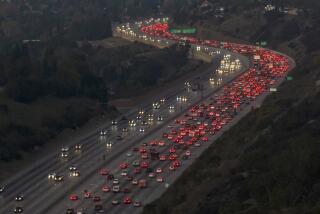Logjam Puts More Uninsured on the Road : Auto insurance: Prop. 103 has gone nowhere, rates are about to rise, and Sacramento dances around the issue.
The auto insurance crisis hasn’t gone away and it’s about to get much worse. Insurance rates will soon rise significantly. The number of uninsured drivers, already at a startling 25% statewide, will increase. Gov. George Deukmejian and the Legislature are trapped in a political minuet, unwilling to settle on legislative reforms that might head off this disaster.
The temporary rate freeze ordered to implement Proposition 103 is about to end and companies are poised to raise rates in the next few months. Then, the 75% of Californians who do buy auto insurance will again scream about affordability. Many will become uninsured drivers.
In addition to the looming increases, we are seeing drastic changes in the California Automobile Assigned Risk Plan. The plan was intended to provide for drivers whose records were so bad that no private company would sell them a policy at an affordable price. It had in reality become the pressure valve for “good drivers” who just cannot afford policies in the ordinary market because premiums would be too high due to their age or where they live.
Recent court-approved changes will force “good drivers” out of the assigned- risk plan, returning it to its original mission. But the staff of the state-administered plan estimates that nearly 70%, or 840,000, of the drivers insured under this program are “good drivers.” Many, when pushed out of the state plan, will not be able to find an affordable policy elsewhere.
The assigned-risk plan has also requested a rate increase of 165%. Bad drivers who are now buying insurance may not be able to afford nearly triple the current average of $675 for minimum coverage.
We face the prospect of a state that purports to require drivers to be insured but in which the proportion of uninsured drivers may soon approach 50%--higher in urban areas. Californians will not be able to afford insurance in either the voluntary market or in the assigned- risk plan. They will have received no help from Proposition 103 or from all of the promises of the Legislature and our governor.
Each year for the past four years, our legislative leaders have said that auto insurance was one of their highest priorities. This year began with Deukmejian saying that he would work with the Assembly Speaker Willie Brown on auto-insurance reform, because it was so important to Californians.
Representatives of consumer and low-income groups drafted, with the support of Assemblyman Pat Johnston (D-Stockton), a plan that won the grudging support of some members of the insurance industry. This proposed low-cost, no-frills $180-a-year policy, based on New York’s no-fault system, was approved by most of the policy analysts who looked at the measure. It had nearly universal editorial support across California. But it wasn’t good enough for some members of the insurance industry, and the trial lawyers hated it because it hurt their ability to profit from every fender-bender. In January, the bill was defeated by these special interests.
The Legislature has had months to work with the governor to come up with an alternative, to no avail. The governor waits for the insurance industry to tell him what it wants. The Speaker waits for the governor to tell him what the governor wants. The Senate Judiciary Committee waits for the Speaker to say what the Assembly and the Governor have agreed to. This is the legislative dance, a waltz in circles with no forward progress.
The elected insurance commissioner provided for by Proposition 103 will take office just about the time when sticker shock hits the California driving public. But the insurance commissioner can’t change the insurance laws. That’s up to the governor and the Legislature.
Our state’s lawmakers refused to pass the workable, low-cost, no-frills policy in the Johnston bill. Neither the trial lawyers nor the insurance companies want to pay for reform, and both groups are happy with the status quo. After six months of dancing around, the politicians haven’t been able to come up with a workable plan of their own.
As this legislative session draws to a close, the Legislature and governor are flinging out new and untested ideas in a frantic effort to choreograph a happy ending. But they are still trying to satisfy the insurance industry and the trial lawyers. They are not doing right by California consumers, who need affordable auto insurance that will provide prompt, undisputed payment for minor accidents and force fraudulent claims out of the system. Consumers who need more than basic coverage should be able to buy it at fair prices.
All of the parts to the solution are available and have been through many legislative hearings--a low-cost no-frills policy, backed by auto-safety and anti-fraud measures. These reforms would combine the best time-tested ideas from other states and go far toward solving California’s auto insurance crisis.
More to Read
Inside the business of entertainment
The Wide Shot brings you news, analysis and insights on everything from streaming wars to production — and what it all means for the future.
You may occasionally receive promotional content from the Los Angeles Times.










